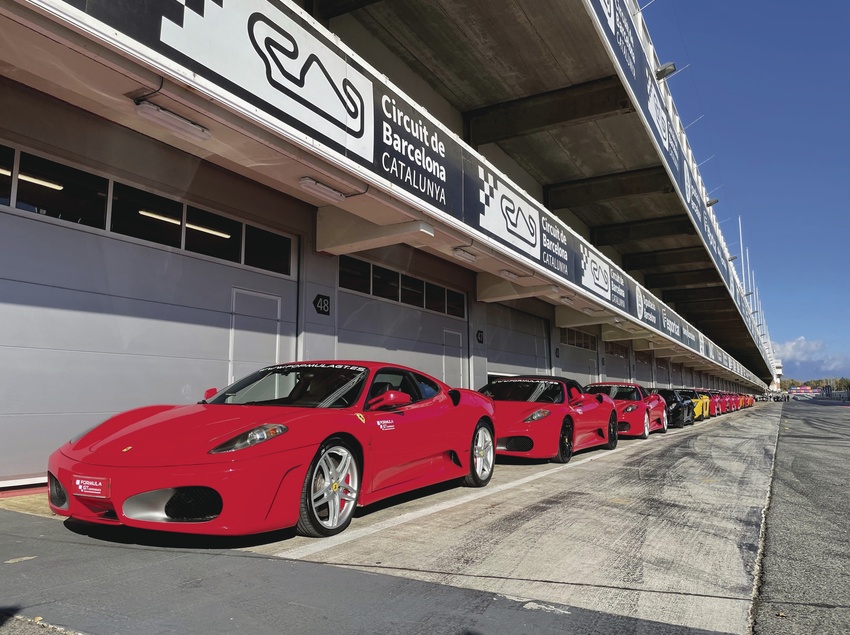Spain’s Catalonia region is keen to position itself at the heart of new mobility innovation and exploration. Its curriculum vitae is not lacking: a long history of vehicle manufacturing, global headquarters for the SEAT and Cupra brands, a host of modern circuits and test tracks, more than 20 automotive-related R&D centres, several universities, and a growing number of trade fairs place it competitively on the world’s stage. But is this enough to secure it a leading position in CASE (connected, autonomous, shared, and electric) mobility development?
Smart cities
That’s a big focus for Public Office for the Transformation of the Mobility and Automotive Industry (OPTIMA). The office advises automotive companies on the transformation towards new mobility and electrification. “Today, Catalonia plays a major role in promoting the transformation of the automotive industry towards the electric and connected vehicle industry of the future,” says Tomás Megía, Executive Director at OPTIMA.

Barcelona, the capital of Catalonia, is arguably the heart of southern Europe’s 5G push and has been actively promoting the development of pilot projects to test and validate 5G-related technologies. Telecoms provider Telefonica has been collaborating with local automaker SEAT on demonstrations of 5G-enabled connected car functions in L’Hospitalet de Llobregat, a municipality next to Barcelona.
“The Catalan capital, synonymous with design and the avant-garde, is today the main 5G and sustainable mobility hub in southern Europe,” comments Sònia Serracarbassa, Director of the Catalunya Convention Bureau (CCB). Serracarbassa and her team are working with OPTIMA and Catalonia Trade & Investment to promote the Catalunya Meetings & Mobility project, designed to attract international business events.
Developments around connected technology, particularly cellular vehicle-to-everything (C-V2X), promise a future in which vehicles can communicate with surrounding infrastructure such as traffic lights and other vehicles. It will prove a key element of the smart city of the future. The European Institute of Innovation and Technology (EIT) Urban Mobility project is all about ushering in a new era of smart cities. Headquartered in Barcelona, the project represents the largest European initiative to transform urban mobility, with a co-funding of up to €400m (US$422m) between 2020 and 2026. The push towards more liveable urban spaces includes exploring new forms of electric and shared mobility as well as boosting the competitiveness of the mobility industry.
Gathering of experts and leaders
CES, IAA, the North American International Auto Show—the automotive industry is not short of events that bring together stakeholders and offer a platform for knowledge exchange. But Catalonia believes it has something special to offer, particularly around sustainable mobility. The region is already host to Tomorrow.Mobility World Congress (TMWC). Jointly organised by Fira de Barcelona and EIT Urban Mobility, TMWC brings the wider mobility sector face-to-face to spark innovation, find solutions and create business opportunities. “This event is a great place to connect and benchmark with others, to be with potential clients, and coordinate actions to make progress,” commented Miguel Eiras, Smart Cities and Urban Transformation Global Leader at Deloitte.

Held within the framework of Smart City Expo World Congress, TMWC 2022 featured 400 speakers and attracted 20,402 in-person attendees from 134 countries during three days of debate and action. “It moved the needle on accelerating smart, sustainable urban mobility,” commented OPTIMA’s Megía. Touching on event highlights and topic areas, he points to active mobility for citizens with the 15-minute city concept, the impact of the energy crisis, and challenges around urban mobility and mobility data sharing.
The International Mobility Congress (IMC) is another key event in the region. Held in Sitges, it brings together those within the mobility, public transport, and infrastructure sectors. “IMC analyses experiences and case studies, and lets the leading international experts speak about their field. The main players within the public transport sector get together to organise this congress which wants to position Catalonia as the centre of the debate on present and future mobility,” says Serracarbassa.
Nurturing new talent
The start-up community is a hotbed of innovation and nurturing that will be pivotal to realising the vision of a cleaner, safer more efficient mobility ecosystem. Barcelona Tech City, a congregation of numerous start-ups, recently announced the creation of a new start-up hub dedicated exclusively to automotive and mobility companies. The city has steadily been attracting a growing number of new players keen to use it as a testbed. Scooter providers Silence and Cooltra, charging expert Wallbox, solar power tech company SIARQ, and flexible bus services provider NEMI represent just some of the newcomers active in the region. In total, the city is home to more than 1,500 emerging companies, many of them founded by expats
Thanks to Barcelona’s several universities, prestigious MBA programmes, technology centres and coding academies, there is a solid talent pool on tap. The Skylab Coders Academy was recently voted the top bootcamp for programmers in the world. The region also benefits from the Professional Automotive Training Centre of Catalonia, which specialises in providing automotive training to increase the competitiveness of the industry.

Automakers have been taking a more active role in the nurturing of new talent. For example, SEAT, Volkswagen Group Innovation, and the Universitat Politècnica de Catalunya (UPC) initiated CARNET (Cooperative Automotive Research Network) in 2016 and it’s still going strong. This is a Barcelona-based open hub for industrial and academic partners from the areas of automotive and mobility research and innovation. CARNET is centred on project-based collaboration for urban mobility solutions that close the gap between academic research and industrial innovation.
What next?
Moving forward, agencies like OPTIMA and CCB are determined to ensure Catalonia remains a pivotal region for new mobility, whether in the testing of new technology, the production of vehicles or the networking of industry experts. The Automotive Industry Cluster of Catalonia (CIAC) has already brought together more than 200 companies in the sector, all of which are actively pursuing projects designed to boost the industry’s competitiveness. As the global 5G network grows, the connected-car developments coming out of Barcelona should prove increasingly pivotal to realising its full potential.

